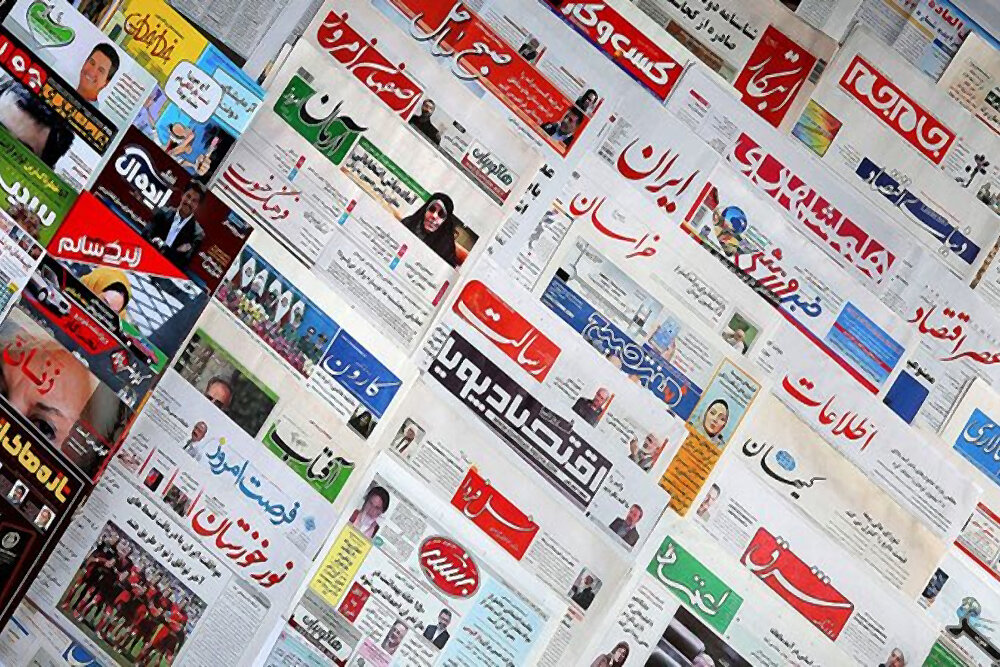TEHRAN PAPERS

In reaction to the appointment of the new head of the central bank, Etemad also ran a story headlined ‘A positive but insufficient step’. Three economic experts told the publication that the success of the new appointment depends on solving issues beyond his authority.
Iran’s economy is looking forward to positive events such as the approval of FATF or facilitating the entry and exit of currency and even the lifting of sanctions, which are possible with new decisions and changes in foreign policy, the publication stated.
Unless the foreign policy reforms are made, even the best economic teams are not able to make fundamental changes, however they can reduce the pace of economic collapse and prevent the negative economic growth in various fields, money and banking expert Kamran Nedri told Etemad.
In the current situation, changing people in managerial posts does not appear effective, however, changing policies does. As long as the macro policies are not changed, it is not possible to take a fundamental step in the path to economy, noted Ahmed Hatami-Yazdi, the former managing director of Saderat bank.
“The first problem of the central bank in the current situation is the lack of foreign currency to control supply and demand, and the second one is an underground economy, and third, foreign currencies are abroad and out of the system’s control,” Abbass Hashi, a money and banking expert, remarked.
On the competence of the new head of the central bank, Hashi said Farzin does not make impulsive decisions as he believes in professional work and has practical work experience.
Vatan-e Emrooz: Foreign currency stabilization policies
The Vatan-e Emrooz newspaper analyzed the policies of the new governor of the central bank to prevent the upward trend of foreign currency price.
The publication said increasing interest rates and bond interest rates are the plans that the new central banker will follow to deal with the rising inflation and currency price.
Russia, during the war in Ukraine, implemented this policy simultaneously as the unprecedented sanctions imposed on the country, especially on its energy exports by Europe. The policy increased the interest rate by 2 times and brought it to about 20%. On the other hand, it severely limited capital flight, which brought the value of the ruble back to pre-war levels.
The report claimed that the Russian monetary policy is the one chosen by Mohammad-Reza Farzin.
Jomhouri Eslami: Comprehensive approach needed to reform economic system
Jomhouri Eslami, in its editorial, criticized replacing the central banker and wrote that the problem is not only in the management of the central bank. Rather, it said, the economic management system is severely inefficient. Taking a look at any of the sub-categories of the economic ministries, the unorganized process is quite evident.
You can hope that the new chief banker to solve the currency problem and restore the value of the national currency to its real position only if you lift the sanctions and remove the existing international obstacles on the way to trade and economic interactions, it argued.
Arman-e Melli: Caught in development trap
Today’s world is in a very complicated situation and a few mistakes can lead to numerous problems even for the biggest economic powers, so countries like Iran, that lack a development model, are caught in the trap of development, a researcher on political economy said in an interview with Arman-e Melli.
In line with sustainable development, there should be economic prosperity in the country, social and political participation should be strengthened as well as social justice, and natural resources should be protected, however, all of these have been weakened over the past 20 years, Kamal Athari remarked.
In fact, different classes of society such as women, youth, farmers and others reacted and protested against the loss of development principles, he said, adding, the protestors were demanding their right to development, which have been lost.
He further suggested that the Iranian society needs to move from the primary ideology to a superior ideology. In the superior ideology, development patterns must be defined and different social and political forces must be aligned to realize the pattern, the researcher pointed out.
Kayhan: Who helped the sanctioners?
The conservative Kayhan newspaper argued in a commentary that reformists gave America and Europe an excuse to avoid canceling sanctions by supporting the unrest.
The newspaper, finding fault with the reform faction, stated that “their media tried to highlight the right to protest, human rights, and women’s rights, create widespread and deep belief in the unrest, blame the regime for the riots, and introduce riots as ‘protest’ and ‘rioters’ as ordinary people.”
Their actions encouraged the enemies to intensify threats and sanctions against Iran, to create social insecurity, economic crisis and a sudden increase in inflation, the author claimed.
The author concluded that they [reformists] are the culprits in the intensification of sanctions and these political losers are the real beneficiaries of the sanctions, who seek their survival through weakening the economy.

No comments:
Post a Comment